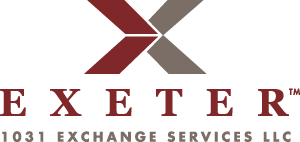Financial Strength, Bonding, Insurance, Equity Capital and Stability
To protect clients' investment and the integrity of their 1031 Exchange transaction, their Qualified Intermediary (Accommodator) should be licensed, regulated and audited by a regulatory body, must have a reputation for performance, must have the capacity and resources to properly service your 1031 Exchange transaction, must have the experience and expertise to ensure it is completed properly and must have the necessary insurance and bonding coverage to protect you against possible errors made by the Qualified Intermediary or misappropriation of your 1031 Exchange funds by the Qualified Intermediary.
Government Oversight — Licensed, Regulated and Audited
Exeter 1031 Exchange Services, LLC is one of the only 1031 Exchange Qualified Intermediaries that has any kind of government regulatory oversight, which makes it one of the safest and most secure Qualified Intermediaries in the industry today. Exeter 1031 Exchange Services, LLC deposits, holds and safeguards clients' 1031 Exchange funds in separate, segregated, dual-signature Qualified Trust Accounts through Exeter Trust Company.
Exeter Trust Company is licensed, regulated and audited by the Wyoming Division of Banking and is therefore held to a much higher fiduciary standard. Government oversight is critical to ensure the safety and security of the clients' 1031 Exchange funds and that the Qualified Intermediary is operating in a safe and sound manner. (See our article entitled Qualified Intermediaries Are Not Created Equal).
Evidence of Bonding and Insurance
Exeter 1031 Exchange Services, LLC, Exeter Trust Company, and its affiliate companies, maintain $5 million in fidelity bond coverage to protect your fiduciary funds. And, every transaction is protected with $5 million in errors and omissions insurance coverage to insure clients from any error or omission that we might make.
Qualified Trust Accounts or Qualified Escrow Accounts
Clients' 1031 Exchange funds are deposited, held and safeguarded in separate, segregated, dual-signature Qualified Trust Accounts with Exeter Trust Company in order to protect clients' 1031 Exchange funds. The Qualified Trust Account ensures that clients' 1031 Exchange funds are clearly classified as fiduciary or trust (client) funds and not corporate funds. Qualified Escrow Accounts serve the same purpose as well, although recent court decisions have leaned more favorably toward the use of the Qualified Trust Account structure.
Internal Process Controls and Risk Management
We have established a multi-layered process that includes process controls, validations, audits and reviews to ensure we deliver on our promises and meet our fiduciary obligations and responsibilities as a Qualified Intermediary for your 1031 Exchange. Nothing escapes our attention in any transaction.
Experience and Expertise
Exeter professionals have a long-standing track record and reputation in designing, structuring and coordinating all kinds of 1031 Exchanges involving multiple types of property, from high-rise commercial office buildings to residential condominium properties, and even personal property like commercial aircraft. Every transaction is handled with the same attention to detail and accuracy because our reputation for excellence is solidified with every successful outcome.
Trusted, Stable and Reliable
The executives of Exeter 1031 Exchange Services, LLC are pillars of the 1031 Exchange Qualified Intermediary industry and have been for decades. Our executive team has almost a century of combined experience handling 1031 Exchanges. President and Chief Executive Officer William "Bill" L. Exeter is celebrating his 35th anniversary (2019) in the 1031 Exchange Qualified Intermediary industry. He enjoys a long history and solid reputation among peers. We at Exeter 1031 approach every transaction confident of a successful outcome. You can, too.
State of Washington Required Disclosures
"Washington state law, RCW 19.310.040, requires an exchange facilitator to either maintain a fidelity bond in an amount of not less than one million dollars that protects clients against losses caused by criminal acts of the exchange facilitator, or hold all client funds in a qualified escrow account or qualified trust."
